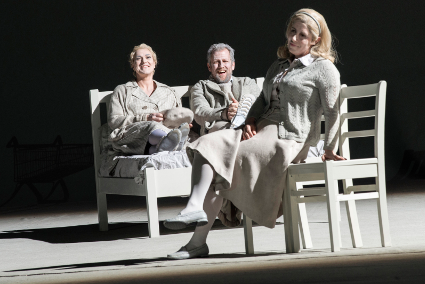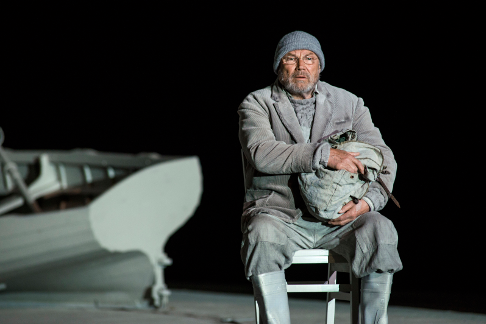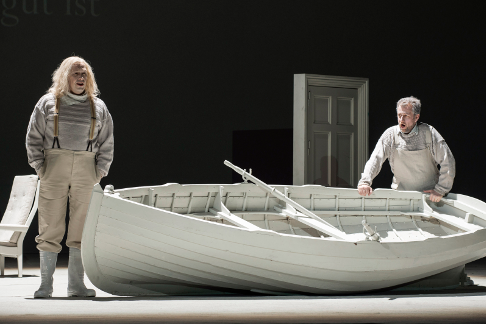
12 Sep 2016
Morgen und Abend at Berlin
After its world premiere at Royal Opera House in London last year, the German première of Georg Friedrich Haas’s Morgen und Abend took place at the Deutsche Oper Berlin.
English Touring Opera are delighted to announce a season of lyric monodramas to tour nationally from October to December. The season features music for solo singer and piano by Argento, Britten, Tippett and Shostakovich with a bold and inventive approach to making opera during social distancing.
This tenth of ten Live from London concerts was in fact a recorded live performance from California. It was no less enjoyable for that, and it was also uplifting to learn that this wasn’t in fact the ‘last’ LfL event that we will be able to enjoy, courtesy of VOCES8 and their fellow vocal ensembles (more below …).
Ever since Wigmore Hall announced their superb series of autumn concerts, all streamed live and available free of charge, I’d been looking forward to this song recital by Ian Bostridge and Imogen Cooper.
Although Stile Antico’s programme article for their Live from London recital introduced their selection from the many treasures of the English Renaissance in the context of the theological debates and upheavals of the Tudor and Elizabethan years, their performance was more evocative of private chamber music than of public liturgy.
Evidently, face masks don’t stifle appreciative “Bravo!”s. And, reducing audience numbers doesn’t lower the volume of such acclamations. For, the audience at Wigmore Hall gave soprano Elizabeth Llewellyn and pianist Simon Lepper a greatly deserved warm reception and hearty response following this lunchtime recital of late-Romantic song.
For this week’s Live from London vocal recital we moved from the home of VOCES8, St Anne and St Agnes in the City of London, to Kings Place, where The Sixteen - who have been associate artists at the venue for some time - presented a programme of music and words bound together by the theme of ‘reflection’.
'Such is your divine Disposation that both you excellently understand, and royally entertaine the Exercise of Musicke.’
‘And there was war in heaven: Michael and his angels fought against the dragon; and the dragon fought and his angels, And prevailed not; neither was their place found any more in heaven … that old serpent … Satan, which deceiveth the whole world: he was cast out into the earth, and his angels were cast out with him.’
There was never any doubt that the fifth of the twelve Met Stars Live in Concert broadcasts was going to be a palpably intense and vivid event, as well as a musically stunning and theatrically enervating experience.
‘Love’ was the theme for this Live from London performance by Apollo5. Given the complexity and diversity of that human emotion, and Apollo5’s reputation for versatility and diverse repertoire, ranging from Renaissance choral music to jazz, from contemporary classical works to popular song, it was no surprise that their programme spanned 500 years and several musical styles.
The Academy of St Martin in the Fields have titled their autumn series of eight concerts - which are taking place at 5pm and 7.30pm on two Saturdays each month at their home venue in Trafalgar Square, and being filmed for streaming the following Thursday - ‘re:connect’.
The London Symphony Orchestra opened their Autumn 2020 season with a homage to Oliver Knussen, who died at the age of 66 in July 2018. The programme traced a national musical lineage through the twentieth century, from Britten to Knussen, on to Mark-Anthony Turnage, and entwining the LSO and Rattle too.
With the Live from London digital vocal festival entering the second half of the series, the festival’s host, VOCES8, returned to their home at St Annes and St Agnes in the City of London to present a sequence of ‘Choral Dances’ - vocal music inspired by dance, embracing diverse genres from the Renaissance madrigal to swing jazz.
Just a few unison string wriggles from the opening of Mozart’s overture to Le nozze di Figaro are enough to make any opera-lover perch on the edge of their seat, in excited anticipation of the drama in music to come, so there could be no other curtain-raiser for this Gala Concert at the Royal Opera House, the latest instalment from ‘their House’ to ‘our houses’.
"Before the ending of the day, creator of all things, we pray that, with your accustomed mercy, you may watch over us."
The doors at The Metropolitan Opera will not open to live audiences until 2021 at the earliest, and the likelihood of normal operatic life resuming in cities around the world looks but a distant dream at present. But, while we may not be invited from our homes into the opera house for some time yet, with its free daily screenings of past productions and its pay-per-view Met Stars Live in Concert series, the Met continues to bring opera into our homes.
Music-making at this year’s Grange Festival Opera may have fallen silent in June and July, but the country house and extensive grounds of The Grange provided an ideal setting for a weekend of twelve specially conceived ‘promenade’ performances encompassing music and dance.
There’s a “slide of harmony” and “all the bones leave your body at that moment and you collapse to the floor, it’s so extraordinary.”
“Music for a while, shall all your cares beguile.”
The hum of bees rising from myriad scented blooms; gentle strains of birdsong; the cheerful chatter of picnickers beside a still lake; decorous thwacks of leather on willow; song and music floating through the warm evening air.

After its world premiere at Royal Opera House in London last year, the German première of Georg Friedrich Haas’s Morgen und Abend took place at the Deutsche Oper Berlin.
A slow pace and static stage dynamics made in the beginning for a difficult sit during veteran German stage actor Klaus Maria Brandauer’s monologue: a highly challenging first half hour. However the second part offered very memorable musical scenes. Haas’s resonant soundscapes made the trip worth it in the end.
Norwegian author Jon Fosse wrote the libretto based on his novel. In the first part, his sporadic words sound more like exclamations within Haas’ score. The opera contrasts the mystery of arriving in life with the confrontation with death and the hereafter at the departure. “Morgen” (morning) revolves around the birth of fisherman Olai’s (Brandauer) son Johannes.
In the second part, “Abend” (evening), Johannes is old. His daughter Signe takes care of him. Then he wakes up and sees his deceased wife Erna and best friend Peter. After he calls out to his daughter, who can’t hear him, he realizes he has passed. The slender libretto gives the listener all the space to absorb Haas’ spectral cosmos.

Director Graham Vick seemed inspired by Samuel Beckett’s minimal setting, but without the absurd humor. His Endgame comes to mind during “Morgen” as Olai sits alone and speaks in fragments. Together with broken-white costumes, Richard Hudson’s abstract design includes a door frame, a bed, a fishing boat, and several other items scattered on the ashen colored set. Video by 59 projections (A creative direction collective) screened words on stage. Giuseppe di Iorio’s lighting gave the staging the necessary final flashy energetic surge at the end.
The Austrian composer’s soundscapes are rooted in French spectralism, a musical current from the Seventies that can be traced back to Messiaen and even farther to Debussy. Haas’ moods and microtonal effects remind of Ligeti, but his colours and texture recall Kaija Saariaho, though with less detail and instrumental contrast. What Haas lacks in variety, he makes up with raw intensity that slowly grows on you and eventually envelopes you as listener. Before you know it you are captivated by the drama of the second half.
With great focus, Michael Body led the enormous orchestra. He generated great resonating flow from the strings, creating a thick textures. Besides the musicians in the pit, a panoply of percussion stands on each side slightly elevated from the stage. From there, thrilling pounds (or should I say hits) open the work and jolt the audience. Then, though, the libretto’s infrequent rhythm in Brandauer’s monologue about his son’s birth undercuts the production’s momentum. Towards the end of “Morgen”, the pace picks up. With fluctuating intensity, Haas’ soundmass swells and contracts in volume and density, as if a giant musical organism whose breathing results in a mesmerising continuous flow.

During “Abend” Haas also includes vocal echoes of late-Romantic lyricism. It added a human dimension to Haas’s alien world during the interaction between Johannes and his daughter Signe. After, Johannes comes to terms with his passing. The opera ends in Haas’ soundscape of the hereafter.
The rest of the stellar cast impressed. Sarah Wegener as the midwife broke into Olai’s monologue announcing Johannes’s birth as if an invigorating breath of fresh towards the end of “Morgen”. Baritone Christoph Pohl made for an engaging Johannes. He infused the character with conflict and a sense of bewilderment after becoming aware of his death. Contralto Helena Rasker convinced as his wife Erna, while Will Hartmann demonstrated his technical skills in the vocally demanding part of Peter.
If you are interested in hearing exciting soundscapes of orchestral colours and textures, this opera comes highly recommended. With this minimal staging, you can close your eyes and listen to Haas and be transported to a musical world of contemplation about birth and death.
David Pinedo